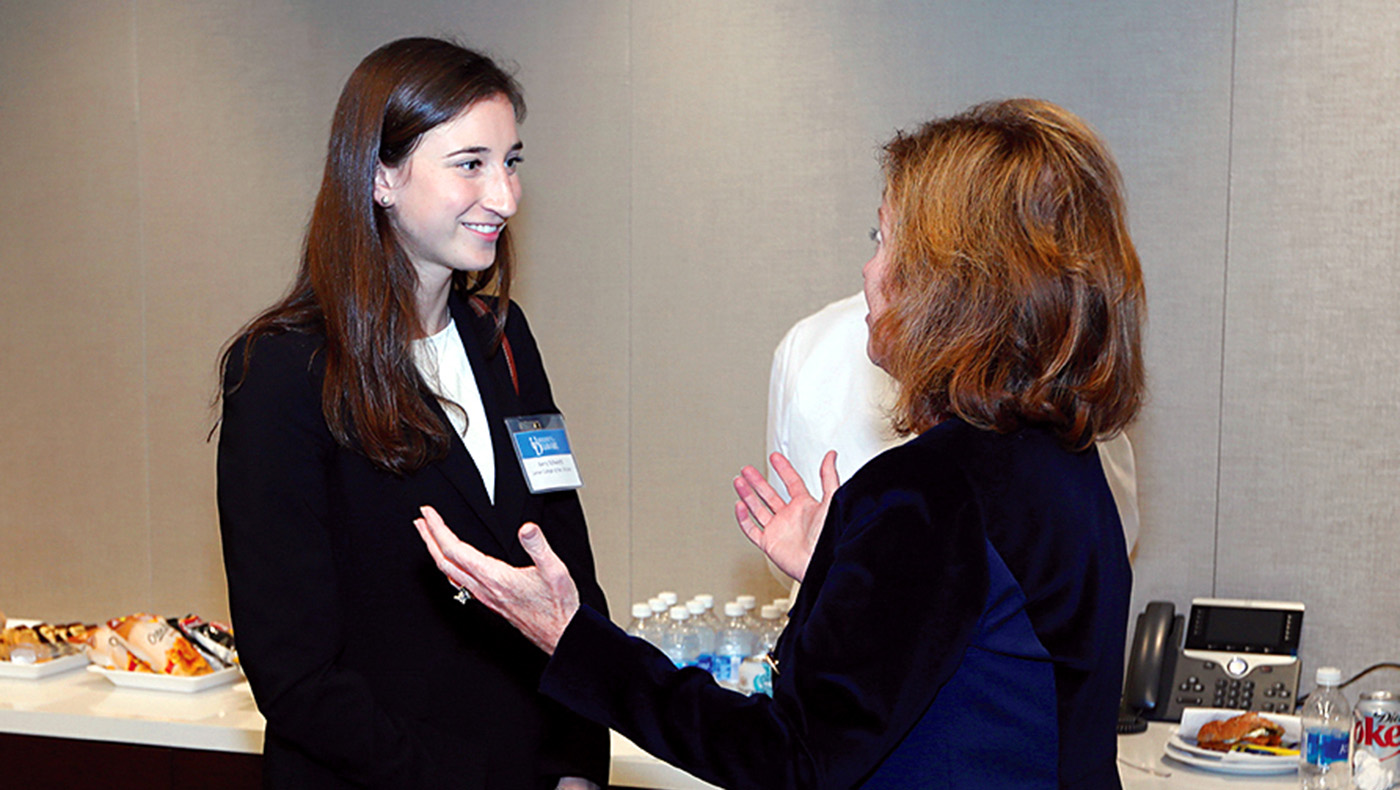“I love that I was paired with a phenomenal mentor who complements me perfectly. He has so much experience, and he has faith in me as a business professional, which in turn, makes me more confident.”
This is how senior sport management major Lindsay Beer described her mentorship through the University of Delaware’s Lerner College.
As the business community increasingly recognizes the value of mentoring as a means of developing both leaders and the future workforce, the Lerner College developed the Executive Mentors Scholars (EMS) and Graduate Executives Mentors (GEM) programs. Managed by the Lerner Career Services Center, these programs establish one-on-one relationships between students and their mentors, who have at least 10 years of experience. The students receive guidance and professional development while building and strengthening their networks.
In this year’s cohort, 65 mentor-student pairs were recently introduced through the EMS program, setting a new record for the total number of matches at 180 pairings. In a recent survey, 90 percent of participant respondents rated their overall program experience as good, very good, or excellent.
Jill Gugino Panté, director of the Lerner Career Services Center, says the mentoring program is one of her favorite aspects of her job.
“Mentoring has always been a part of my life,” Panté said. “Building genuine connections and receiving guidance from someone who has years of experience is an incredible opportunity for our Lerner students. This program gives our students an edge in the job search process.”
One such student is junior finance major Amanda Flores, whose mentor is Hiroko Sproesser, a business process consultant at Agilent Technologies. Flores described their relationship: “We meet once a month… in person or over an online web portal, and email more to keep each other updated. She has been very helpful with me doing mock interviews throughout my internship application process.
“What excites me most about this program is getting to build a strong relationship with my mentor and getting one-on-one professional personal advice,” Flores continued.
Last fall, students and mentors engaged in several developmental activities, including lunch and dinner meetings, mentors introducing their mentees to colleagues, mentees visiting mentors’ workplaces and informational/mock interviews.
Remi Cole, senior international business studies and marketing major, said, “I found it very beneficial that my mentor [Michael Ferris, vice president at HSBC] has introduced me to people in the field I hope to work in, and overall increased my networking skills.”
Developmental topics that mentors and mentees discussed most during their meetings included:
- Mentor background/experience
- Student goals and objectives for the mentoring program
- Student career objectives and professional goals
- Networking opportunities
- Industry insights
- Job search strategies
Senior finance major Brian Uzelac said that his mentor, Eric Emrich, CFO at Independence Capital Partners, LLC, provides helpful opportunities “to see material that isn’t straight from a textbook.”
“My mentor shares with me real work material and it helps me understand the ins and outs of actual business,” Uzelac said. “My ceiling for networking and career prep while in college is much higher now.”
So what makes a successful mentoring relationship? The survey asked both mentors and students to share a beneficial development activity or best practice on their survey response. Mentor best practices included items such as setting up students to shadow mentor at offices, changing up meeting venues and creating goals for the program.
“Mentors need to listen, listen and listen to their mentees; be a coach, not a preacher,” said Peter Saitis, chief financial officer of Ecore International, Inc. and mentor to junior management information systems major Emma Lavelle.
“Keep conversations relevant to the student’s needs,” advised Lisa Murray, chief marketing officer at Octagon and mentor to junior finance major Emily Brown. “My work experience may not reflect theirs specifically, but together we created a fabulous relationship based upon each other’s strengths.”
Kathryn Fuchs, an MBA student in the GEM program, said that her GEM experience provides valuable recommendations and constructive professional advice.
“I am excited about the unbiased, battle-tested feedback on my experience and career trajectory, along with suggestions that come from someone who has an idea of what it takes to build a successful career on my chosen industry,” Fuchs said.
Applications for the EMS program will open later this spring. All applicants must be enrolled in the Lerner College and must be sophomores when applying. The GEM program accepts applicants in the fall.
Check out the Lerner Career Services Center web site for additional information about the mentoring programs.




